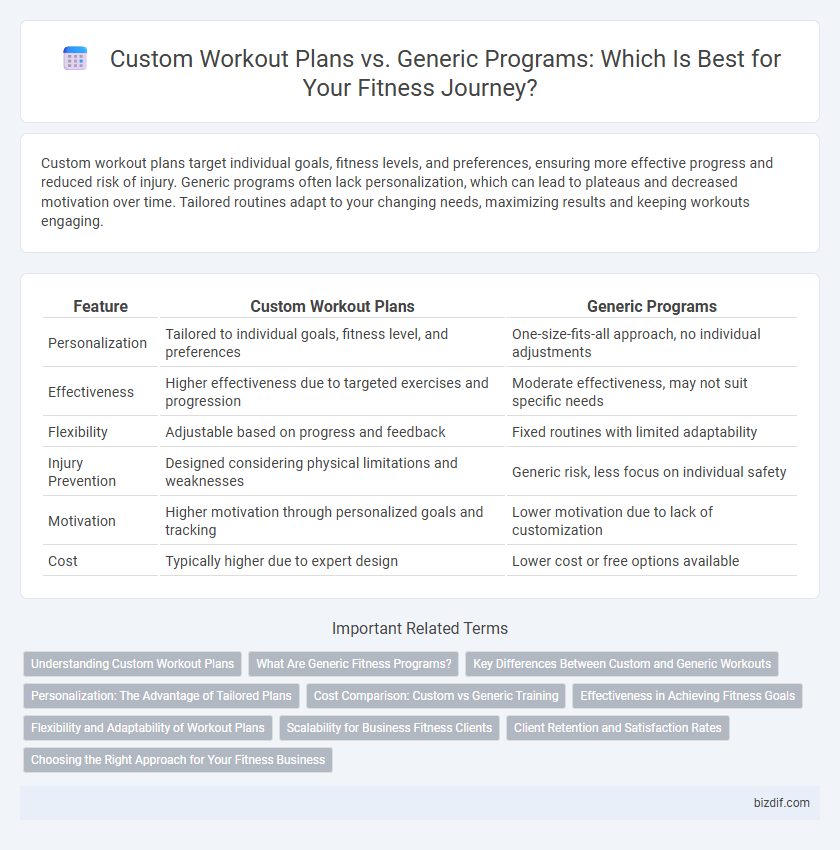Custom workout plans target individual goals, fitness levels, and preferences, ensuring more effective progress and reduced risk of injury. Generic programs often lack personalization, which can lead to plateaus and decreased motivation over time. Tailored routines adapt to your changing needs, maximizing results and keeping workouts engaging.
Table of Comparison
| Feature | Custom Workout Plans | Generic Programs |
|---|---|---|
| Personalization | Tailored to individual goals, fitness level, and preferences | One-size-fits-all approach, no individual adjustments |
| Effectiveness | Higher effectiveness due to targeted exercises and progression | Moderate effectiveness, may not suit specific needs |
| Flexibility | Adjustable based on progress and feedback | Fixed routines with limited adaptability |
| Injury Prevention | Designed considering physical limitations and weaknesses | Generic risk, less focus on individual safety |
| Motivation | Higher motivation through personalized goals and tracking | Lower motivation due to lack of customization |
| Cost | Typically higher due to expert design | Lower cost or free options available |
Understanding Custom Workout Plans
Custom workout plans are tailored to an individual's fitness goals, body type, and lifestyle, ensuring more effective results compared to generic programs. These plans incorporate specific exercises, volume, and intensity based on personal assessments, enhancing motivation and reducing the risk of injury. Personalized training also allows for adjustments in real-time, maximizing progress and addressing unique health considerations.
What Are Generic Fitness Programs?
Generic fitness programs are standardized workout routines designed for a broad audience without customization based on individual goals, fitness levels, or preferences. These programs usually follow a one-size-fits-all approach, often focusing on general strength, cardio, or flexibility training without accounting for personal limitations or specific outcomes. While accessible and easy to follow, generic programs may lack the precision needed to maximize progress or address unique health conditions effectively.
Key Differences Between Custom and Generic Workouts
Custom workout plans are tailored to an individual's specific fitness goals, body type, and exercise preferences, enhancing effectiveness and motivation. Generic programs offer standardized routines that may not address personal limitations or target unique strength and flexibility needs. Customized plans often include progressive overload and recovery strategies, which generic workouts typically lack, leading to better long-term results.
Personalization: The Advantage of Tailored Plans
Custom workout plans leverage individual fitness levels, goals, and preferences to maximize effectiveness, unlike generic programs that apply a one-size-fits-all approach. Tailored plans adjust exercises, intensity, and progression based on personal data such as body composition, injury history, and lifestyle, enhancing motivation and adherence. Personalized training increases the likelihood of achieving specific outcomes like fat loss, muscle gain, or improved endurance by addressing unique physiological and psychological factors.
Cost Comparison: Custom vs Generic Training
Custom workout plans typically involve higher upfront costs due to personalized assessments and tailored routines, often ranging from $50 to $150 per session or $200 to $600 for a full program. Generic training programs, available through apps or online platforms, usually cost between $10 and $50 monthly, offering a more affordable but less individualized approach. While custom plans may require a larger investment, they often lead to faster progress and better injury prevention compared to generic programs.
Effectiveness in Achieving Fitness Goals
Custom workout plans tailor exercises, intensity, and progression to individual goals, body types, and fitness levels, significantly enhancing effectiveness in achieving specific fitness outcomes. Generic programs often lack personalization, leading to suboptimal results and increased risk of injury due to a one-size-fits-all approach. Studies show personalized training increases adherence and accelerates progress by aligning workouts with unique biomechanical and physiological needs.
Flexibility and Adaptability of Workout Plans
Custom workout plans offer superior flexibility by tailoring exercises to individual fitness levels, goals, and schedules, enabling progressive adjustments based on real-time feedback and performance metrics. In contrast, generic programs lack adaptability, often following a fixed structure that may not address personal limitations or evolving needs, potentially hindering progress and increasing injury risk. Personalized plans leverage data-driven insights and user preferences, ensuring continuous optimization and sustained motivation throughout the fitness journey.
Scalability for Business Fitness Clients
Custom workout plans offer unparalleled scalability for business fitness clients by addressing individual goals, fitness levels, and progress tracking, leading to higher client retention and satisfaction. Unlike generic programs, tailored plans adapt dynamically as clients' needs evolve, enhancing long-term engagement and measurable results. Incorporating scalable technology platforms facilitates seamless customization and efficient management of diverse client portfolios in corporate fitness settings.
Client Retention and Satisfaction Rates
Custom workout plans increase client retention by addressing individual goals, fitness levels, and preferences, leading to higher satisfaction rates. Clients following personalized programs report better progress tracking and motivation compared to generic programs, which often result in plateau and disengagement. Fitness centers offering tailored plans experience improved loyalty and positive reviews, directly impacting long-term business growth.
Choosing the Right Approach for Your Fitness Business
Custom workout plans tailored to individual client goals, fitness levels, and preferences significantly enhance client retention and satisfaction in a fitness business. Generic programs offer scalability and ease of implementation but often lack personalization, which can limit client progress and engagement. Prioritizing bespoke fitness solutions leveraging client data and progress tracking tools aligns better with growing market demand for personalized fitness experiences.
Custom Workout Plans vs Generic Programs Infographic

 bizdif.com
bizdif.com